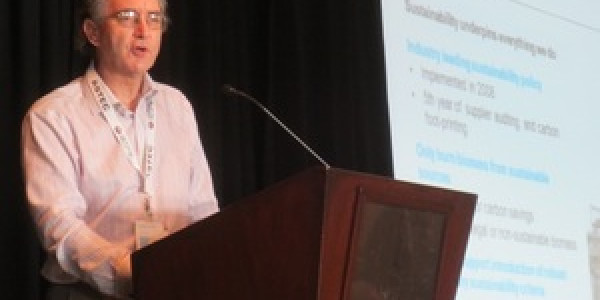Taylor Scott International News
By Tim Portz | October 30, 2013 Nigel Burdett, head of environment at Drax Power, addresses the audience at the U.S. Industrial Pellet Association’s 3rd Annual Exporting Pellets conference. Tim Portz. . . Nigel Burdett, head of environment at Drax Power, kicked off a panel discussion at the U.S. Industrial Pellet Association’s 3rd annual Exporting Pellets Conference, by commenting on the role of sustainability in the transition from coal to wood pellets. “We need to be sustainable in order to capture the subsidy and make the business work,” he said. The panel focused on the sustainable attributes of renewable power produced via wood pellet combustion. The subsidies Burdett spoke of are Renewable Obligation Certificates (ROCs) issued by the U.K. Office of Gas and Electricity Markets. These ROCs are financial instruments that power generators can sell on the open market, boosting the economics of generating renewable energy. In September, the U.K. Department of Energy and Climate Change confirmed that biomass would play a significant role in the march toward the de-carbonization of the U.K. energy sector, but that biomass burned by its power generators must come from sustainable sources if those generators expect to receive ROCs. While final rulemaking has yet to be established by the DECC, power generators in the U.K., pellet suppliers in the North America and elsewhere, and the loggers and landowners that supply biomass to pellet facilities are all preparing for the coming legislation. They are also offering their perspective to policymakers on what they feel are realistic, yet adequately stringent, requirements. At the same time, a larger, more expansive effort is underway to frame up for the general public the vital role that biomass-derived power can, and should, play in driving geologic carbon out of the world’s energy mix. Geologic carbon, the carbon found in fossil fuels and sequestered there for millions of years, is released into the atmosphere when it is combusted for energy. Bob Malmsheimer, professor at the State University of New York College of Environmental Science and Forestry, urged attendees to recognize the inherent differences between geologic carbon and biogenic carbon saying, “When we make products and energy from biogenic carbon instead of geologic carbon, we’ve done something positive for climate change.” Recognizing that the public is continually presented with different studies and models, he continued by stating, “While the timing aspect is debated, the long term benefit is not debatable.” Echoing Malmsheimer’s comments, and diving deeper into an explanation of the science as well as many of the reasons for widespread confusion about the issue, was Martin Junginger, assistant professor at the Copernicus Institute for Sustainability Development at the University of Utrecht. Junginger pointed out that many of the studies that industry critics use to question the sustainability of woody biomass are flawed because they investigate the carbon cycle at a stand level, as opposed to looking at the carbon cycle in the context of a broader forest ecosystem. “Scientists have realized that looking at the landscape of level is the most appropriate,” said Junginger. He explained that if 1 acre of land is converted into biomass feedstocks and burned, there is carbon released into the atmosphere certainly, but that the overall forest system was taking up more carbon as a whole than was being released during the combustion of a percentage of that biomass during energy generation. The panel concluded the discussion by driving home the point that the worst-case scenario for global forests were declining markets for forest products, including woody biomass for pellet production. Repeating an argument that is continually being made by the largest forest owner associations in North America, including the National Alliance of Forest Owners and the Forest Landowners Association, the panel argued that strong markets for all grades and types of forests was the best way to stave off the largest threat to forests, emerging higher economic values for forested acres, including redevelopment. Recognizing that proving the sustainable nature of their supply chains will be a vital aspect of Drax’s business, Burdett underscored the importance of preparing for the coming feedstock tracking requirements saying, “We are going to see a great deal of data being required of suppliers,” and stressing that non-compliance ultimately would cost Drax the most. “We have canceled contracts because adequate data was not available,” he added. Taylor Scott International
Taylor Scott International, Taylor Scott








